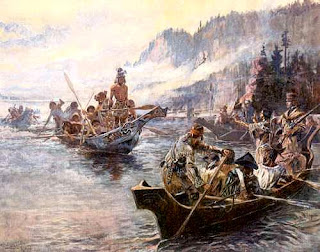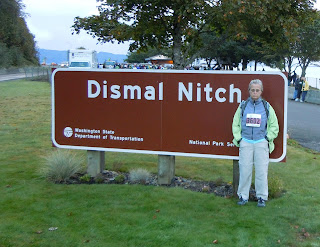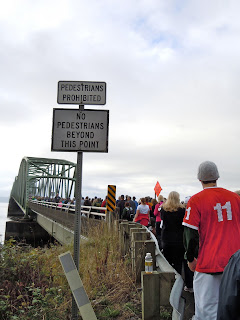It is worth noting that Lewis and Clark, after having withstood hardships and horrors and ambush by mosquitoes, were nearly done in after a few days in the rain at the mouth of the Columbia. Their very survival was in question; their clothes were a fright; they near perished from whininess. They had fetched up in a dot of a cove they called Dismal Nitch, and so it is called to this day, there being no compelling reason to change it. Dismal Nitch is south of Cape Disappointment and just around the bend from Go Stick Your Head In The Oven Bay. It’s rainy.
This is the kind of trouble you could expect from an outfit calling itself the Corps of Discovery, bound and determined to discover things all on their own, when they could have asked anybody and they would have found out how rainy it is. The whole area is renowned for moistness, but they’d have done fine with a little rain gear and a proper attitude. “This is the first of ninety consecutive days of rain,” they might have said, “a good time to catch up on our reading.”
Instead they come boating up wearing buffalo hides that promptly rotted away, and they got out of their canoes and into a giant snit. It rained sideways for six days, which anyone could have told them is quite typical of November, and–as Clark described it–our camp entirely under water dureing the hight of the tide, every man as wet as water could make them all the last night and to day all day as the rain Continued all day…and blew with great violence immediately from the Ocian for about two hours. Were this not Dismal enough, some of the party elected to drink too much salt water and on them it acts as a pergitive. That probably put a capper on things.
At least they had salmon. Salmon are anadromous fish that spawn in tiny streams and make their way, against great odds, to the Ocian, where they live and grow for up to five years, and if everything goes just right, they return towards the waters of their birth and become quite delectable in a lemon caper sauce, if they’re not overcooked, and that’s where most people go wrong. It’s hard to beat a properly prepared salmon, and yet that is just what Lewis and Clark did; they subsisted on “dried fish pounded,” which pretty much defines overdone. Even if they had had the faintest idea what to do with a salmon, it’s going to get on your nerves if you eat it every day all winter long. It’s not like peanut butter.
The native Chinook people, meanwhile, were happily high and dry, wearing clothing woven from the bark of cedar trees–essentially, they were wearing lightweight log cabins, and the rain just sheeted off them. Things were even easier on their descendants, who were able to update with aluminum siding and proper gutters, but these people were sturdy and strong. They steadily supplied the hapless Corps of Discovery with pounded salmon in an effort to turn the tide of invasion, but it was for naught. Soon enough there was an epidemic of white people everywhere you looked, and they commenced doing things Lewis and Clark couldn’t even have dreamt of. Bottled water alone would have rendered them flabbergastric.
They also laid in a bodacious bridge across the mouth of the Columbia, over which Lewis and Clark could have simply strolled to Oregon, not that it would have improved their mood any. They invented automobiles to stick on the bridge. And once they had achieved the invention of the kilometer, they were able to concoct the Great Columbia Crossing, an event wherein thousands of people are bussed over the bridge to good old Dismal Nitch and allowed to walk or run 10 km back to where they started. You can almost hear Lewis and Clark’s minds blowing across the winds of history, but the fact is many activities become plausible when you do not have to slay your own dinner or duct-tape your disintegrating buffalo attire on a daily basis.
On the day Dave and I joined the Great Columbia Crossing, heavy clouds were everywhere, rolling in off the ocean and piling up inland. Nary a drop of rain touched us, because God favored our endeavor, although all around us we could see the squalls dumping rain on the folks He hated. For two hours half of the bridge was closed to automotive traffic. Modern people, especially in the blue states, love bicycle or pedestrian events that inconvenience motorists, and we swell with satisfaction when we see the line of cars creeping sullenly along at our sides. For a short while, we have defeated the scourge of modern-day dependence on fossil fuels, and we swing our arms and thump our chests on our commemorative T-shirts. It’s a great feeling, well worth the two-hour drive from Portland.



For the title alone, this post is worth it. Yes, Lewis and Clark and company were just a bunch of whiners, weren't they? Maybe they were in bad moods because not only were they soaked, but they also couldn't spell.
I have definitely come up in the world since I discovered your blog. What a great way to start my Sunday, with this well documented piece of Murr-humor. We get a lot of drizzly days here in the left-hand corner of the PNW, but rare days of rain like happens in Dismal Nitch.
Hu-murr. I like that variation. I always thought that they spent so much time kvetching that Mr. Government-Paid-Naturalist failed to notice that they had canoed themselves into a rainforest. Other than that bit, I very much enjoy the story of Lewis and Clark, especially as presented in "Undaunted Courage" by Stephen Ambrose. A side trip to Amazon to refresh my memory just cost me $24.50 in book orders! Durn.
Perfect! Mark Knoeffler singing Sailing to Philadelphia in the background, and your post in the foreground. I'm happy merci buckets, as we say here on rainy days.
Dismal Nitch is south of Cape Disappointment and just around the bend from Go Stick Your Head In The Oven Bay. It's rainy.
Oh man, I laughed so hard at this. Thank you, Murr.
And the photo, when you biggen it enough to see your expression, is priceless!
By the way, I may have missed it, but have you ever written about how you came by your first name? I have a vague notion that it means seagull, but maybe that's with an 'e' on the end? Or maybe it's a Corps of Discovery style spelling of the ointment that goes along with frank in sense? Inquiring minds want to know.
Oh how I love my frank and senseless Murr.
Yes, do "biggen" the photo; so great!
Funny, funny stuff. I could not believe that there actually was a place called "Dismal Nitch." I figured you MUST have photoshopped that sign. (Soooo many word play jokes come to mind.) However, the internets verify that it does exist. Amazing! Couldn't find Go Stick Your Head in the Oven Bay, though.
Why in the world would any of them have decided to drink a bunch of salt water??? Fresh water pouring from the sky, but they decide it's too convenient and tasty?
You could be a helluva docent at the Museum of Natural History. Although, visitors falling to the floor laughing in a fit of tears and peeing on themselves might be a bit of a distraction.
I do love your genius.
Oh that Lewis & Clark – they just keep showing up wherever I go. My husband is spearheading Lewis & Clark month at his university in November. We don't know why – it just seemed like the right thing to do 🙂
But what about Sacajawea — or is that another story? I'm sure there was an Indian maiden involved somewhere.
I do enjoy your history lessons. I'm even laughing in class.
Yes, I have always wondered why they parked themselves in that awful little corner. Must have been getting dark and their flashlight batteries gave out.
This is why I didn't vote for Washington insider, Thomas Jefferson and his wasteful Washington spending squandering taxpayer dollars on the Louisiana Purchase and racking up per diem for Lewis AND Clark and their luxurious taxpayer-funded junket just so they could say they saw the Pacific Ocien. We need change.
Bridge picture thank you, Murr. Approve! We went to Dismal Nitch! Excellent blue spring day. Genuine canoes like theirs. I sat in one.
Diode
I lived through your Oregon rainy season twice and it does take some hale and hardiness. But then again, I wasn't wearing a log cabin. Though I may disagree with you that salmon isn't like peanut butter. A little mayo and mustard and it makes a great spread, as leftovers.
It does indeed. It's the every-day-for-four-months part that rankles.
Dale, it's not complicated. My college friends couldn't pronounce "Mary." Julie Zickefoose likes to adorn me with an "e" for the seabird, and I'm happy to take that feather from her. I'd-a probably spelt it that way myself back in the 70s if I'd ever heard of it.
Diode's right about the canoes. I've been there when the historical recreation folks (including a Chinook leader)showed replica Chinook canoes and costumes and a Corps camp, complete with dressed-up characters/explainers. Dismal Nitch in Lewis & Clark's time was even more dismal than Murr's face says, believe it or not; that flat fill where Murr's standing didn't exist when the party got stuck there, unable to make their way toward the mouth of the Columbia because of the strong storm heading upriver. They had to perch for days, miserably cold and wet, on that steep forested incline.
Shoot, if they'd had a perch, they could have skipped the salmon for a day.
I'm just giggling at Dismal Nitch.
You do a very convincing "dismal", there, Murr. And the number on your chest is a nice touch, too. I hope someone posted your bail.
Gosh, I'd love a "Dismal Nitch" in Ontario. We only have an idiotic sounding Punkeydoodle Corners. Of course, we don't have the rain for a DN, just mosquitoes and blackflies, which might explain the name.
And even an inlander like meself knows you don't drink the ocian.
Gosh, I'd love a "Dismal Nitch" in Ontario. We only have an idiotic sounding Punkeydoodle Corners. Of course, we don't have the rain for a DN, just mosquitoes and blackflies, which might explain the name.
And even an inlander like meself knows you don't drink the ocian.
Shoot, if they'd had a perch, they could have skipped the salmon for a day.
It does indeed. It's the every-day-for-four-months part that rankles.
Dale, it's not complicated. My college friends couldn't pronounce "Mary." Julie Zickefoose likes to adorn me with an "e" for the seabird, and I'm happy to take that feather from her. I'd-a probably spelt it that way myself back in the 70s if I'd ever heard of it.
And the photo, when you biggen it enough to see your expression, is priceless!
Perfect! Mark Knoeffler singing Sailing to Philadelphia in the background, and your post in the foreground. I'm happy merci buckets, as we say here on rainy days.
Hu-murr. I like that variation. I always thought that they spent so much time kvetching that Mr. Government-Paid-Naturalist failed to notice that they had canoed themselves into a rainforest. Other than that bit, I very much enjoy the story of Lewis and Clark, especially as presented in "Undaunted Courage" by Stephen Ambrose. A side trip to Amazon to refresh my memory just cost me $24.50 in book orders! Durn.
For the title alone, this post is worth it. Yes, Lewis and Clark and company were just a bunch of whiners, weren't they? Maybe they were in bad moods because not only were they soaked, but they also couldn't spell.